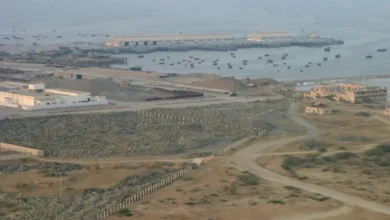Why is Germany imposing more restrictions on its borders?

Germany’s centre-left government has decided to impose temporary land border restrictions aimed at controlling irregular migration in the wake of a knife attack and electoral gains made by a far-right party.
The new curbs, announced by the government on Monday, come days after the anti-immigration Alternative for Germany (AfD) won elections to the eastern state of Thuringia and came a close second in the neighbouring state of Saxony. Those elections were held in the shadow of a knife attack, allegedly carried out by a Syrian asylum seeker, that killed three people in the western city of Solingen.
What are Germany’s plans?
Interior Minister Nancy Faeser announced on Monday that the controls will start on September 16 and initially last for six months with the option of being renewed.
Temporary controls are to be imposed at land borders with France, Luxembourg, the Netherlands, Belgium and Denmark.
This will add to restrictions already in place for Austria, the Czech Republic, Poland and Switzerland – the other four of the nine countries with which Germany shares its more than 3,700km-long (2,300-mile-long) border – to check arrivals of immigrants.
Germany has informed the European Commission and the neighbouring countries, which are all part of the Schengen Area, the Europe-wide free movement zone, about its plans to impose tighter controls.
The rules for the 29 Schengen nations stipulate that “reintroduction of border control at the internal borders must be applied as a last resort measure, in exceptional situations, and must respect the principle of proportionality”.
Faeser said the government has drawn up plans to allow local authorities to directly reject and turn away migrants at the borders, a measure that could prove controversial and could face legal challenges. The interior minister did not provide any details.
German Chancellor Olaf Scholz, under pressure from the far right, has gradually been sharpening his rhetoric on immigrants. He has promised to deport immigrants accused of committing serious crimes.
Germany deported 28 Afghan nationals charged with criminal acts
What’s the reasoning?
Faeser said Germany is going beyond the European Union’s controls and tightening up security internally to be better prepared against “irregular migration” and what she called “Islamist terrorism and serious crime”.
“We are doing everything we can to better protect people in our country against this,” she said.
The chorus of voices opposed to immigration has considerably grown in Germany since the country of 84 million people automatically granted asylum to about one million Ukrainians fleeing Russia’s 2022 invasion as it faced energy and economic challenges.
Nearly 10 years ago, Germany was hailed by many as a beacon of empathy for taking in more than a million refugees, many from Syria, under former Chancellor Angela Merkel. But Germany also has an economic rationale for encouraging immigration: Experts said the country needs about 1.5 million immigrants each year as its workforce declines because of an ageing society and flat population growth.
What’s changed?
Riding on a cocktail of economic and cultural grievances during a cost of living crisis, the far-right AfD has often accused the government of being soft on immigrants. Its win in regional elections this month marked the first victory for a far-right party in Germany since World War II.
on August 30, the first time it restarted the practice after the 2021 return of the Taliban to power in Afghanistan following a withdrawal by the United States.










